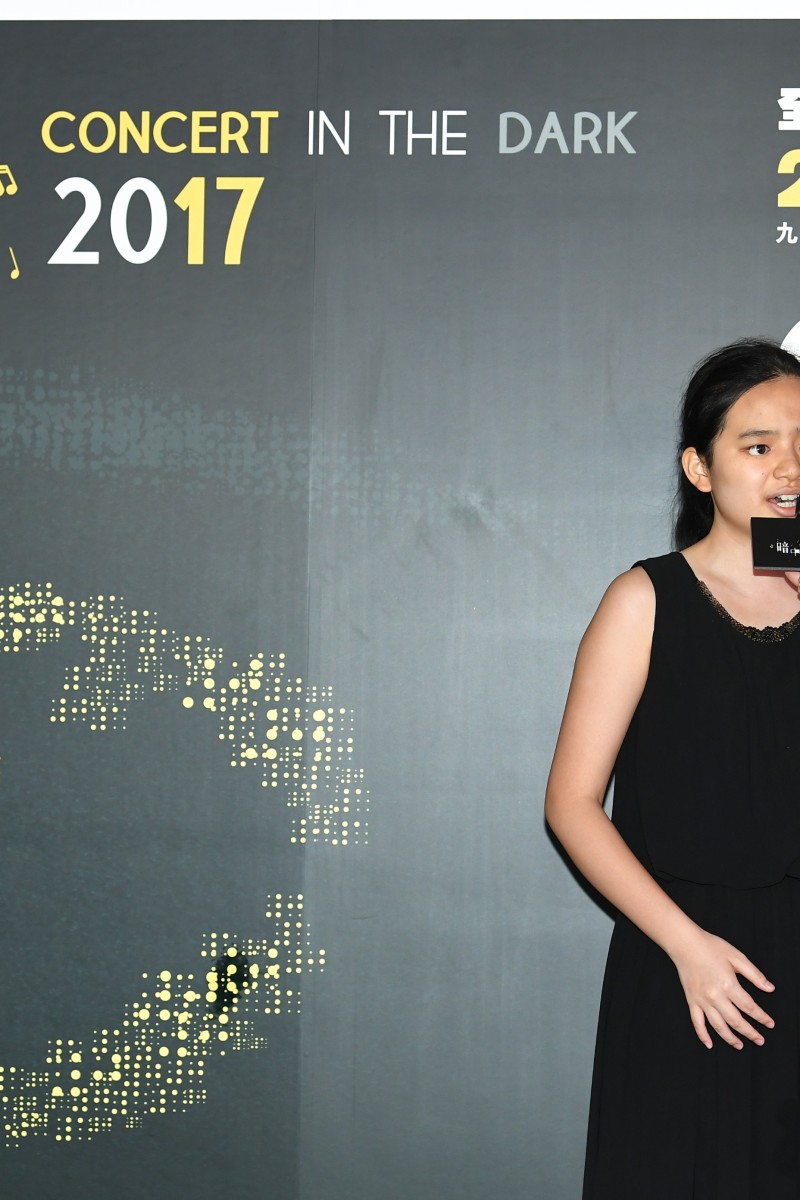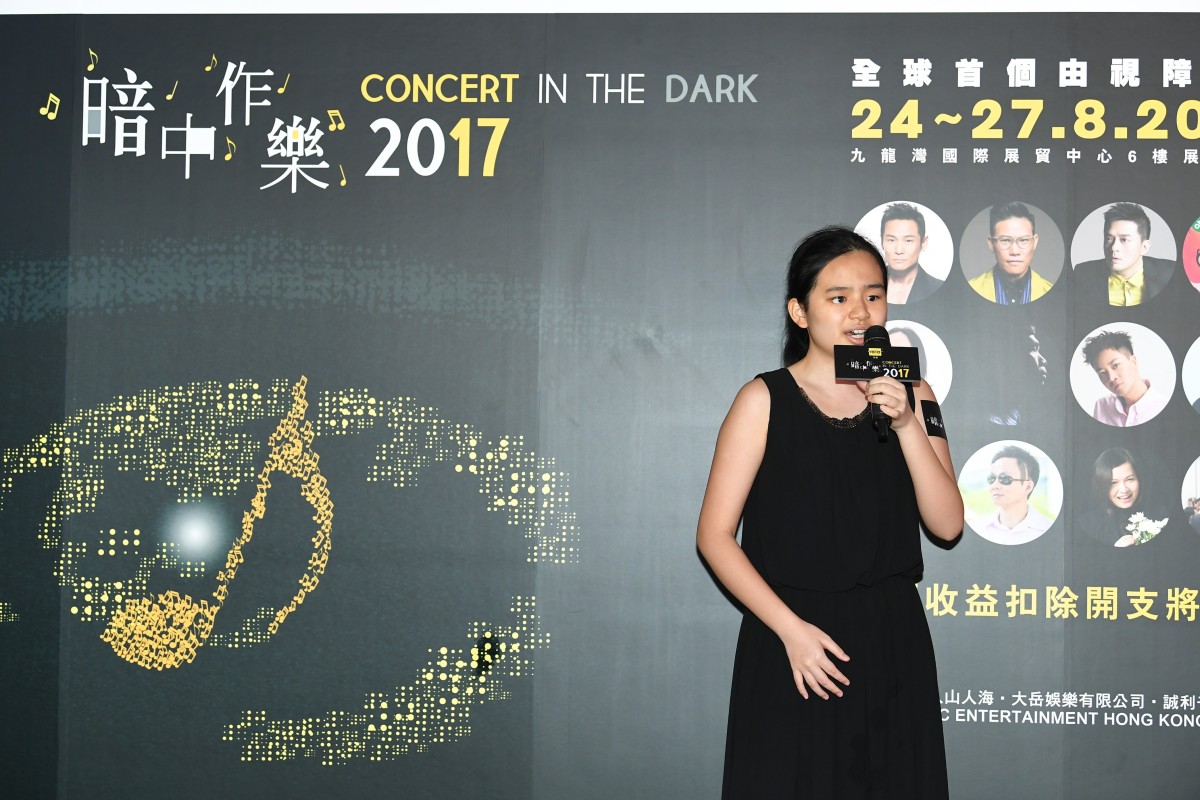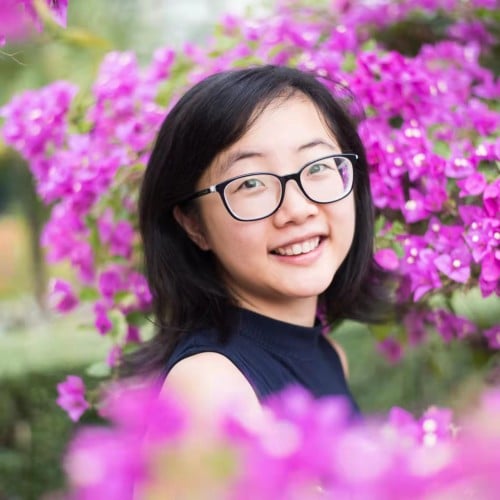
Blind singer Michelle Siu, who won Supernova 2013, talks learning music by Braille and performing in Concert in the Dark
The 20-year-old lost her sight very young, but her voice has the ability to move people to tears
 Michelle Siu will perform at Concert in the Dark 2017 later this month
Michelle Siu will perform at Concert in the Dark 2017 later this monthMichelle Siu Hoi-yan is used to being in the spotlight, even if she can’t actually see it. Siu, 20, is blind, and has been since she was three-months-old when retinoblastoma – a form of cancer that affects the eyes – took away her sight and, quite literally, her eyes. But the loss of her sight has not stopped the Year Two music student at Chinese University, from becoming somewhat of a musical prodigy.
Siu has won more than 50 music competitions, including the massive inter-school music competition Supernova 2013, and this year has received a special invitation to perform at the annual Concert in the Dark – a concert organised by the visually impaired and held in complete darkness.
From an early age, it was clear to Siu’s family that she had a real talent for music. Siu learned to play the piano when she was four, joined a choir when she turned eight, and at 10 she started taking singing lessons from someone who teaches at Central Conservatory of Music – the mainland’s leading music school.
“My parents thought people who are visually impaired might have more sensitive hearing,” says Siu, but adds that her parents encouraged her to try as many things as possible, like running and swimming.
Her father, Derek Siu, adds: “We want to give her [as many options as possible] but we don’t want to push her in a certain direction.” He recalls one moment when a school principal told him that a blind person would find it impossible – or at least tremendously difficult – to fully master music, as they don’t have the ability to memorise a lengthy music sheet.
Siu proved them wrong. She agreed that the biggest challenge she faces in music is learning to read sheet music, as “people normally use their eyes to read and learn music”, but as a blind person, she has to learn the scores by listening and by touch, by feeling the notes printed in Braille (raised dots that can be read with the fingers).
“Sometimes, the preparation time [given] isn’t enough to produce a sheet in Braille,” she says, and the only way she can perform is to learn it by ear.
Often, it’s not that there is no time to produce a Braille music sheet, but that it’s simply too costly. Before she sat her ABRSM Grade Eight Music Theory exam in 2015, Siu tried to find past papers to revise from. “It costs around HK$60 for one past paper, but if you want it in Braille, it’s HK$4,800,” she says.
It’s not like the technology isn’t there – it takes just one machine to print a Braille music sheet, but the tricky part is in finding a visually impaired person who understands music to “translate” and dot the sheet. This is something Siu hopes to one day do, and help lower the cost of Braille music sheet for other blind music students. “I also want to build a music library,” she adds.
She didn’t pass her 2015 ABRSM exam on the first go, but didn’t let the failure daunt her – she simply retook the exam, and passed on her second attempt. “When you try to accomplish something, accept that there’s a chance of failure,” she says. “There’s a chance of success too, as long as you’re willing to try.”
“The beauty of music lies in its ability to be used to communicate with others,” Siu told Young Post, before adding that she prefers singing more than she likes to play the piano. “You [are the person who] carries whatever messages there are in the lyrics to the audience ... my singing teacher once said, as performers, we’re a bridge between a composer and the audience.”
Her father is full of praise for her voice, and says that it’s as if she has a magic power. “When she sings, there’s a moment when it hits you, and you’re done for ... it’s like a voice from heaven. I’ve never told her this, but sometimes when she sings, I’m moved to tears, even after all these years,” he says.
Siu says she hears many people come up to her after her performances, and they tell her they’ve cried and felt emotionally touched by her singing, which makes her very happy.
“I study every single song that I perform and try to find better ways to interpret them,” she says, adding the songs she sings are mostly written by others, so the key is to make someone else’s song her own.
That might change in the future – later this month, Siu will bring her own song to her performance at Concert in the Dark, one she based on what she had submitted for last year’s DSE music exam. “It’s my way of thanking my parents, and the parents of all blind people out there, for taking care of us,” she says.
And just as she has never let her visual impairment stop her from pursuing music, from running, or from swimming, Siu has not let it stop her from being just like any other 20-year-old girl out there. She revels in getting her hair and make-up done for her performances, and looks forward to dressing up for Concert in the Dark. “I’m always super impressed by how make-up artists can make me look pretty – or so I’ve been told,” she says with a laugh.
This year’s Concert in the Dark will run from August 24-27. Tickets are available at Cityline.
Edited by Ginny Wong
